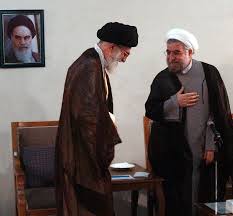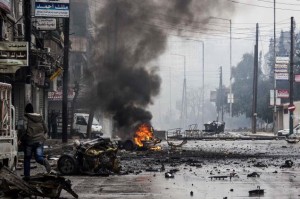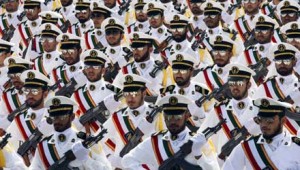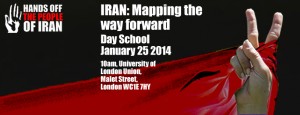This is an edited version of a talk given by Mike Macnair to the January 25 Hands Off the People of Iran day school
Since the last national meeting of Hands Off the People of Iran there have been some very substantial changes to the policy of US imperialism, as well as to the policy of the Iranian government, following last year’s ‘election’ of Hassan Rowhani as president (in practice, these were not free elections; more the exercise of choice by the supreme leader). We have also seen the opening of public negotiations – private negotiations had been taking place significantly before the election of Rowhani. And there is an interim deal for an extremely limited relaxation of sanctions in exchange for what is in substance capitulation by the regime on the nuclear enrichment issue.
I use the word ‘capitulation’, but in reality it was a rational course of action on the part of the regime, taking into account the actual relation of forces, the operation of sanctions and their impact. By contrast, it would in a certain sense have been irrational for the regime to pursue the object of nuclear enrichment against the will of the United States. ‘In a certain sense’, because there was a certain rationality for the regime in presenting itself as a national champion of the autonomy of Iran and so on. But at the same time, having regard to the global relation of forces, the situation is not one in which the pursuit of nationalist agendas against the will of the United States is a rational course of action for any country. We have seen that spectacularly in the cases of Zimbabwe, Iraq and many more.
US policy
US policy in the wake of the opening up of public negotiations is now extremely obscure. In Egypt there has been substantial restoration of the ‘military regime without Mubarak’ in the wake of Mushir Sisi’s overthrow of the elected Muslim Brotherhood president, Mohamed Mursi, and the US has in effect ‘talked both ways’ in relation to the regime. The US is not claiming that the army coup is welcome or a step towards ‘constitutional rule’, which it clearly is not. But it had evidently been seeking some sort of deal with the Muslim Brotherhood before that period, and it is no longer in a position to pursue that agenda now.
Meanwhile, the ‘Libyan revolution’ turns out merely to have produced a failed state with localised militias. As for Syria, the civil war is ongoing and negotiations do not seem to be leading anywhere – military analysts generally judge that the regime is gradually winning. Various US commentators say that admittedly there has been a lot of aid from Iran and from Hezbollah, plus logistical help and supplies from Russia. Nevertheless, it does look as though the regime is gaining the upper hand. Again the attitude of the United States has been extremely variable: from threatening action following the crossing by the Syrian regime of the “red line” of the use of chemical weapons, to backing a negotiated settlement.
Most recently there has been a revival of the Sunni insurgency linked to al Qa’eda in western Iraq. The Iraqi Shia government is an artefact of the US invasion, but is also an ally of the Iranian regime. US responses are extremely unclear.
In Syria particularly, although there has been anti-regime rhetoric from the US, we cannot speak of solid US support for any part of the opposition. It is true that aid is being sent, with US acceptance, to the opposition groups from the Gulf States and Saudi Arabia and it is very unlikely that they are doing this directly against the will of the United States: they have a degree of autonomy, but not that much. But this does not represent a determination on the part of the US to ensure victory for the opposition,
The Saudi regime and Israel clearly think there has been a turn in US policy towards a deal with Iran, which is against their interests. Part of this policy is diplomatic manoeuvring of the hard cop/soft cop type in connection with the negotiations. But it has gone a little bit further than one would expect, certainly on the part of the Saudis, in that respect. Washington ‘Beltway commentariat’ pieces are more than usually varied and confused, and do not show a debate between clear lines of action.
There is a school of thought that the US should reorient its policy in the Middle East to reconciliation with the Iranian clerical regime, with the consequences for US alliances which would flow from that, including not just refusing to give active support to the opposition in Syria, but trying to make some kind of deal with the Ba’athist regime. One can see a possible reason for such a course. After the ‘Arab spring’ the US fairly clearly attempted to make a deal with the Muslim Brotherhood in Egypt, and with other Islamists, using its existing alliance with Saudi Arabia as the linchpin. However, what has become clear both in Libya and Syria and also in a sense in Egypt, is the inability of the Sunni Islamist groups to create order.
This is also true in a sense in Egypt. The Muslim Brotherhood throughout its time in government always had snapping at its heels Salafist tendencies of a more extreme character. This made it necessary for the Brotherhood itself to take a more strongly Islamist line than the Turkish government (which western commentators were holding up as a model for the MB). And then, in turn, the Brotherhood’s more strongly Islamist line put it at odds with the Egyptian urban middle class, posed problems for the tourist industry, which is a very substantial part of the Egyptian economy, and also involved conflict with the army, judiciary, etc. Hence the development of a movement of opposition against Mursi and his pre-emptive overthrow by the army. So Egypt is an instance of the inability of the MB to create order.
To put it another way, these are examples of the inability of Saudi clients to create order. The Saudi regime itself is extraordinarily primitive politically: the precarious alliance of the large Saud family with a section of Salafist ulama, a regime which is able to maintain legitimacy solely by the massive disbursement of oil rents to the ‘native’ population and the maintenance of a large migrant labour underclass. It is unsurprising that translating Saudi support for Salafist policies into countries with large Arab cities and without major oil revenues fails to produce workable political models.
In contrast the Iranian regime clearly is able to maintain a sort of order. The Iraqi Shia government, with the backing of Iran, appears to have done that for the imperialists’ purposes, though only by ‘sectarian cleansing’, and so not in Sunni-majority areas. The ‘Islamic State of Iraq and the Levant’ creates no more than localised sectarian militia operations.
In Syria, similarly, the Islamists – as much as, if not more than, the ‘secular’ opposition – are proving to be incapable of creating a serious counter-order to the regime in areas they ‘control’. It is the same with the Sunni Islamist groups in Libya. And so there is a logic for the US in reorienting its alliances and looking more favourably on the Shia regime in Iran, because at least this regime can create a degree of order.
It cannot be said, however, that this is a definite turn on the part of the US. The agitation for increased sanctions coming out of the Congress is one sign of that. And US commentator Juan Cole suggests that the treasury department is agitating against the easing of sanctions. I am not entirely sure why that would be the case, but, if it is true, it could be because the lifting of sanctions would mean that the US would have to release large quantities of money which it is holding. If that is the reason then it is an extraordinarily short-termist view.
Regime change
There is an alternative line, for which the aim remains regime change in Iran – and this is not just among Republicans. There are people associated with the Democrats and with the administration who have projected the line that the negotiations are simply a diplomatic stage: escalating demands will be placed on the regime, which will force Iran out of the negotiations and thereby lose its diplomatic cover.
The people favouring this line are actually those who proposed in early 2013 that there should be private negotiations with the clear statement that there were two alternatives on the table. Either there would be a deal, under which Iran would obtain civil nuclear power under tight controls, with international inspectors and so forth, with the regime making as many concessions as were necessary for that to take place; or there would be a full-scale US attack. Not an Israeli surgical strike on Iranian nuclear facilities, but a full-scale US air, naval and missile attack. In other words, not an invasion, but a ‘shock and awe’ bombing campaign with an emphasis on taking out Iranian air and naval capabilities, as well as its potential nuclear capacity.
It seems to be agreed across the board that the ‘surgical strike’ option is not real, that the real options are either a negotiated solution or a full-scale bombing campaign. But at the same time there is also a lot of talk presenting Israel as the hard cop – ‘If we don’t get a solution soon, then Israel will attack’ – giving the impression that the United States will be unable to keep its attack dog on the leash for an indefinite period of time.
We should remember in this context that the long period of sanctions against Iraq, combined with episodic military attacks, in the period 1991- 2002 was punctuated by negotiations, by partial relaxations of sanctions, by ‘a deal is possible’ type periods – and still it ended in war.
Indeed, when Lord Goldsmith, briefed by US lawyers, presented the legal justification for war against Iraq in 2003, he claimed that the 1991 war had never actually finished. Therefore, since there had been a breach by the Iraqis of the terms of the ceasefire laid out in 1991, there was a right to take military action without further legal authorisation.
The context then is the persisting sanctions regime. We in Hopi have repeatedly made the point that the ‘sanctions regime’ is a euphemistic term, that it is in reality a commercial blockade or siege of Iran. These activities at any time before the very recent past would be understood as acts of war. The conduct of the United States and of the western powers in relation to this regime is a form of warfare against Iran. It is not perhaps as obvious or as immediate and spectacular as bombing campaigns, invasions and so on: but it is, nevertheless, a form of warfare.
It is a form of warfare which again, as we have repeatedly demonstrated, is actually aimed at the civilian population. In spite of the talk of targeting the regime, the reality is that those close to it are always able to find a way round the sanctions. They have been throughout. Recently, thanks to the corruption scandal in Turkey, one of the means by which actors within the Iranian regime have been able to find ways around the sanctions – and indeed even enrich themselves – has been revealed to the world. The people who are hit by the sanctions are the civilian population, for whom the payment of wages, medical capabilities, etc have been adversely affected.
So it is not only the case that the United States has been for some years pursuing a war of sanctions (even if this has now been slightly mitigated by their very partial lifting through the negotiations), but this is also actually a terrorist policy. Terrorism, to the extent that the word is not purely ideological, consists of attacks directed at the civilian population with the purpose of inducing fear and terror. That is what the sanctions policy is.
The question then is, why has the US been pursuing a war policy against Iran?
Carter doctrine
The long-term background is that of the Carter doctrine, which was actually formulated by president Jimmy before the outbreak of the Iranian revolution of 1979. According to this doctrine, it is essential for the security of the United States that no ‘outside power’ (it is unclear what exactly that means) should be capable of conducting military operations in the Persian Gulf. This is not peculiar. There are all sorts of similar US ‘national security’ doctrines, the most spectacular of which was adopted in the late 1940s: that it is essential for the security of the United States that the US navy has unrestricted access to the Chinese coast. That is to say that the US does not, still, recognise that there is such a thing as Chinese territorial waters.
But the question in a sense is, why is the Carter doctrine in place? Because of it, the overthrow of the shah of Iran was viewed as an immediate attack on US security; because of it, the US backed Iran in the 1980-88 Iran-Iraq war, both directly and through the agency of Britain and so on. Why?
The very standard, commonplace leftwing explanation is that the United States needs cheap oil as the basis for the ‘consumer society’. Now certainly Carter’s public motivations for this doctrine were based on that – that is what he gave as his public explanation. But in fact US operations in the Middle East have tended since the 1980s (and certainly including the Iran sanctions) to increase the price of oil, not reduce it. Moreover, US interests and involvement in the region goes back to the displacement of Britain and France in the 1940s and 1950s: when – for example – Britain and the US overthrew the Mossadeq government of Iran in 1953, the upshot was that the oil companies that were nationalised under Mossadeq passed from British ownership prior to nationalisation to predominate US ownership under the shah. Moreover, at this time the problem was hardly one of access to cheap oil: in that period, the US was a major producer and exporter of oil, so it cannot be the case that the US economy was being strangled by the high cost of oil and that this was the reason for those US operations in the 1950s.
Today, the US is moving back in the direction of ‘energy independence’ through fracking and so on, though it does not expect to attain the status it enjoyed in the 1950s until around 2020-25. But, although events since 2011 have led to disorientation of US policy and to a loss of control, Washington remains deeply concerned with the Middle East and the need to manoeuvre in an agile way, which is difficult due to the US constitutional structure.
Control
The immediate question, therefore, is actually one of global control. With regard to the Middle East the question is posed not in relation to cheap oil as the foundation of the consumer society, but as oil as a munition of war. Oil which drives tanks. Oil which drives military aircraft, trucks and so on, none of which can be driven by electrical power. So that what the US wants from control of the Middle East is the ability to turn off the taps to other hypothetical rival powers.
Again, we can go back further than this. The US has been interested in global control since the 1940s – predating the cold war obviously. In 1941-47 the initial aim of US foreign policy was to prevent the re-emergence of the British empire. And indeed in 1944-47 the US was still looking to use its alliance with the Soviet Union to block any sort of deal which would lead to the revival of the British empire. There is a very useful discussion of this in Ben Steill’s recent book, The battle of Bretton Woods, which is about global monetary policy and US-UK rivalry at that time.
The underlying issue, at the end of the day, is the global reserve currency and the advantages that come with it, centrally in financial markets. In this respect the US has taken over the role which Britain enjoyed from the 19th century down to 1940. If the global financial taps are under your control you can dictate access to markets – in particular markets for capital goods. You can also dictate access to raw materials at favourable terms (which does not necessarily mean cheaply). In the situation that the US has been in since its effective defeat in Indochina in the middle 1970s, it has actually been advantageous to the United States for the price of oil to be high, as compared to its rivals in Europe and particular China, which does not have any significant oil resources.
It is a common error – and a standard piece of ideology – for bourgeois economists to claim that the relative strength of the currency is immediately related to the strength of the economy, and that if there is a strong economy there will automatically be a strong currency, and therefore exchange rates will auto-adjust in a floating currency regime. But it does not work like that.
The strength of currency relies, at the end of the day, on the ability of the state to enforce payment of debts. The currencies we use are not gold, but debt instruments. And at the end of the day the ability to enforce payment of debts flows from military strength. In turn military strength flows from productive capabilities – but productive capability under certain conditions, the conditions of global, great-power war. The US is the world’s top-dog country because it won in 1941-45. Just as Britain was the world’s top-dog country because it won 1789-1815.
This brings us back towards the concrete. The first point is that the United States remains absolutely dominant, despite being in relative decline. It is undoubtedly the case that the US armed forces are more powerful than the next 10 armed forces put together.
The consequence of being the world’s top-dog country is that financial transactions tend to run through your financial centre, and your domestic economy tends to become financialised. Amongst other effects, ‘onshore’ land values, and hence rents and other housing costs, tend to rise, so that in turn wages have to go up. The result is the ‘offshoring’ of productive capacity elsewhere in search of lower land and wage costs. This, in turn, undermines the long-term basis of the military power which makes the country world top-dog. You can keep paying for the immediate military power out of the tribute received from retaining reserve currency status and control of a major financial centre; but this financial tribute flows increasingly from the appearance of strength, rather than from underlying productive dominance, leading to military strength. In order to retain the appearance of strength, it becomes necessary to take military initiatives of one sort or another to demonstrate that you are strong (while as far as possible avoiding a great-power war which would demonstrate the hollowness of that claim).
In the period down to 1975, the US’s policy sought to create an order beneficial to global capitalist development. However, since the defeat in Indochina, US practice has changed: initially aiming to give the USSR and its allies a taste of ‘insurgency’, and beginning with Mozambique, Angola and Cambodia, the US demonstrated its power by simple destruction - reducing states and societies to rubble and warlordism. Libya is only the most recent example.
Going back to the debates among the various authors in the Beltway commentariat, they are very much concerned with the rise of the Islamic State of Iraq and the Levant in Fallujah and so on; they are desperately concerned that the course of action that the United States is currently engaged in will make it appear weak. The result is profound irrationalities in decision-making, and one of the features of that which is visible in the analysts’ debate is over whether to reorient relations towards Iran. This is pretty clearly a rational course of action from the point of view of US capital, but at the same time, because of the danger that it will make the US state appear weak, there is another school of thought, which argues particularly for much bigger overt US intervention in Syria and the drawing of ‘red lines’ against Iran (for example, against continued support for the Syrian Ba’athist regime).
So there is a real risk of the war of sanctions turning into a bombing war. The fact that there are negotiations and a few sanctions have been lifted does not mean that this risk has been wholly removed.
Counterreformation
The second issue is that we are not just in a period of the relative decline of the United States, but in a period of the decline of capitalism as a social order, as a practice.
The form of this decline is in a sense just like the period of the counterreformation in feudalism, in which there was an aggressive state promotion of feudalism and Catholicism. We are in the counterreformation period of capitalism. Neoliberal globalisation is partly in the interests of the United States, because the US is too much in relative decline to be able to afford the concessions to rival powers that it made during the cold war period or the ‘golden age’ of the 1950s and 60s. But neoliberal globalisation also partly reflects an aspiration of capital to restore another ‘golden age’ – the period before 1917 – and to get rid of all the concessions that were made to the working class subsequently (universal suffrage, the welfare state in Britain and so on). This aim of going back implies a much more aggressive state promotion of state-backed pseudo-capitalism.
And that too is present in the negotiations phase in relation to Iran. As Yassamine Mather has written in a number of recent articles, the Rowhani regime is actually more aggressively neoliberal, or more overtly, ideologically neoliberal, than the Ahmadinejad regime was.
There was a lot of talk after 2009, and to an extent continuing today, amongst the liberal left to the effect that ‘neoliberalism is over’, ‘neoliberalism is dead’ and so on. But the reality is that in the five years which have passed since the crash of 2009 we now talk the language of ‘structural reform’ rather than that of ‘neoliberal globalisation’. There is some nibbling at the edges of bringing back protectionism, in one way or another. But the underlying neoliberal offensive of capital against the working class – and of the United States against the subordinate powers through aggressive trade liberalisation, through demands that wages must fall to ‘competitive’ levels and welfare systems be cut – is not only still with us, but it is very much alive and kicking. So any idea that the negotiations between the US and Iran will result in better conditions for the Iranian working class is an illusion. Whether there are negotiations or not, whether sanctions are removed or not, the US will continue to demand ‘structural reform’, the end of subsidies, wage cuts, (and in private, the suppression of trade unions), and so on.
In conclusion, there is a real, continuing danger of a reversion to the policy of regime change and hot war. Most of the sanctions – or, more bluntly, the US-led siege of Iran – continue; and, even if all the sanctions were lifted, there is the continuing pressure of US-led neoliberalism, which the Rowhani government clearly supports, for attacks on working people and the poor.
Do not imagine, therefore, that the negotiations and any potential deal will remove the continuing threats against the people of Iran emanating from the United States.






